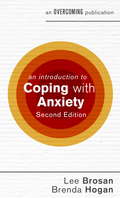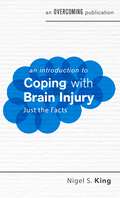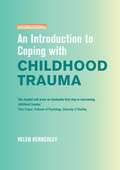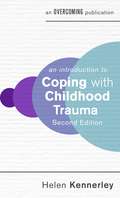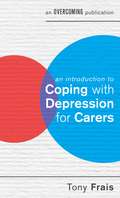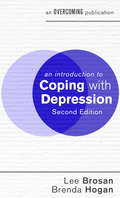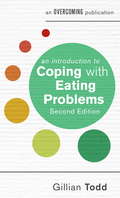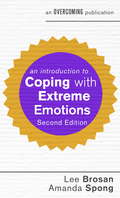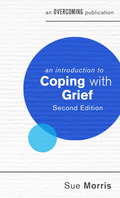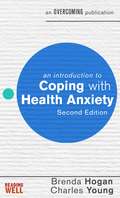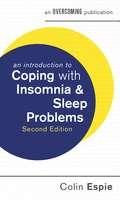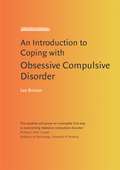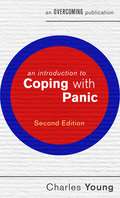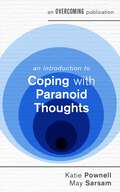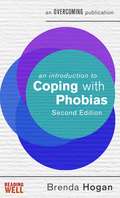- Table View
- List View
An Introduction to Coping with Anxiety, 2nd Edition (An Introduction to Coping series)
by Brenda Hogan Leonora BrosanOvercoming app now available via iTunes and the Google Play Store.Anxiety is one of the most common mental health conditions worldwide, affecting millions of people each year. But it can be treated effectively with cognitive behavioural therapy (CBT).Written by experienced practitioners, this introductory book can help you if anxiety has become a problem. It explains what anxiety is and how it makes you feel when it becomes unmanageable or lasts for long periods of time. It will help you to understand your symptoms and is ideal as an immediate coping strategy and as a preliminary to fuller therapy. You will learn:· What anxiety is and how it develops· Physical symptoms to look out for· How to spot and challenge thoughts that make you anxious· Ways to change how you behave in order to reduce your feelings of anxiety
An Introduction to Coping with Brain Injury (An Introduction to Coping series)
by Nigel S. KingJust the facts for coping with the after-effects of a brain injuryAcquired Brain Injury (ABI) usually refers to people who have suffered a head injury or stroke but also includes those who have had brain tumours, an anoxic injury (where the brain has been starved of oxygen) or brain illnesses like encephalitis and meningitis. After an ABI, the brain undergoes a very slow healing process before improvements slow down and eventually plateau. This is different to other forms of brain conditions where the journey is more of a deteriorating one over time.ABI is commonly called 'a hidden disability' as it can easily be missed or misunderstood by others. Also it can significantly affect those close to the person and therefore it is frequently called 'a family affair' too. As the issues are often hidden, complicated and affect patients and families alike, this book can act as a roadmap to help you and your loved ones navigate through the complex and often unexpected challenges that can arise following a brain injury, using:- Cognitive rehabilitation approaches to understand and manage changes in our thinking abilities- Cognitive behavioural approaches to address ways in which our thoughts, feelings, actions and physical reactions relate to each other
An Introduction to Coping with Brain Injury (An Introduction to Coping series)
by Nigel S. KingJust the facts for coping with the after-effects of a brain injuryAcquired Brain Injury (ABI) usually refers to people who have suffered a head injury or stroke but also includes those who have had brain tumours, an anoxic injury (where the brain has been starved of oxygen) or brain illnesses like encephalitis and meningitis. After an ABI, the brain undergoes a very slow healing process before improvements slow down and eventually plateau. This is different to other forms of brain conditions where the journey is more of a deteriorating one over time.ABI is commonly called 'a hidden disability' as it can easily be missed or misunderstood by others. Also it can significantly affect those close to the person and therefore it is frequently called 'a family affair' too. As the issues are often hidden, complicated and affect patients and families alike, this book can act as a roadmap to help you and your loved ones navigate through the complex and often unexpected challenges that can arise following a brain injury, using:- Cognitive rehabilitation approaches to understand and manage changes in our thinking abilities- Cognitive behavioural approaches to address ways in which our thoughts, feelings, actions and physical reactions relate to each other
An Introduction to Coping with Childhood Trauma (An Introduction To Coping Ser.)
by Helen KennerleyThis is a new addition to the popular Introduction to Coping with series of Cognitive Behavioural Therapy based self-help booklets. Written by the author of the bestselling self-help titles Overcoming Anxiety and Overcoming Childhood Trauma, this new title offers valuable guidance for those who have experienced trauma as a child, be it emotional, physical or sexual. This useful self-help guide looks at the psychological impact of childhood trauma and offers some helpful strategies, based on CBT, to help the sufferer start on the road to recovery. Also contains useful information on how to get specialist help. This practical booklet will also be a valuable resource for health professionals and family members.
An Introduction to Coping with Childhood Trauma (An\introduction To Coping Ser.)
by Helen KennerleyThis is a new addition to the popular Introduction to Coping with series of Cognitive Behavioural Therapy based self-help booklets. Written by the author of the bestselling self-help titles Overcoming Anxiety and Overcoming Childhood Trauma, this new title offers valuable guidance for those who have experienced trauma as a child, be it emotional, physical or sexual. This useful self-help guide looks at the psychological impact of childhood trauma and offers some helpful strategies, based on CBT, to help the sufferer start on the road to recovery. Also contains useful information on how to get specialist help. This practical booklet will also be a valuable resource for health professionals and family members.
An Introduction to Coping with Childhood Trauma, 2nd Edition (An Introduction to Coping series)
by Helen KennerleyPractical support for how to overcome childhood traumaMany psychological and emotional problems faced by adults have their roots in childhood trauma, and this invaluable self-help guide offers advice and techniques based on cognitive behavioural therapy (CBT) for anyone who has experienced trauma as a child, be it emotional, physical or sexual.Written by an experienced practitioner, this book is for anyone who has been hurt or neglected as a child. If you are struggling with difficulties in relationships, with self-confidence or mood, this book will help you address these common experiences as an immediate coping strategy or as a preliminary to fuller therapy. The updated second edition will help you: - Understand the psychological impact of childhood trauma - Know where to turn for further help and resources - Learn useful CBT strategies to start on the road to recovery and resilience
An Introduction to Coping with Childhood Trauma, 2nd Edition (An Introduction to Coping series)
by Helen KennerleyPractical support for how to overcome childhood traumaMany psychological and emotional problems faced by adults have their roots in childhood trauma, and this invaluable self-help guide offers advice and techniques based on cognitive behavioural therapy (CBT) for anyone who has experienced trauma as a child, be it emotional, physical or sexual.Written by an experienced practitioner, this book is for anyone who has been hurt or neglected as a child. If you are struggling with difficulties in relationships, with self-confidence or mood, this book will help you address these common experiences as an immediate coping strategy or as a preliminary to fuller therapy. The updated second edition will help you: - Understand the psychological impact of childhood trauma - Know where to turn for further help and resources - Learn useful CBT strategies to start on the road to recovery and resilience
An Introduction to Coping with Depression for Carers
by Tony FraisAn indispensable guide offering insight and support to carers of people with depression Looking after a person with depression can often leave carers emotionally and physically exhausted. This short, straightforward and easily understandable guide offers valuable advice on how carers can: - better understand the nature of depression and how it affects both patient and carer - have a clearer understanding of the treatment options for the patient, including medication and therapy - lessen the impact of the illness on the carer's life - find the help and support they need - maintain their own well-being whilst supporting the patient through to recovery and beyond Although aimed at the carer, this is a guide that is equally valuable to the patient themselves and to their wider family and friends in promoting a better understanding of the experience of depression.
An Introduction to Coping with Depression for Carers (An Introduction to Coping series)
by Tony FraisAn indispensable guide offering insight and support to carers of people with depressionLooking after a person with depression can often leave carers emotionally and physically exhausted. This short, straightforward and easily understandable guide offers valuable advice on how carers can:- better understand the nature of depression and how it affects both patient and carer- have a clearer understanding of the treatment options for the patient, including medication and therapy- lessen the impact of the illness on the carer's life- find the help and support they need- maintain their own well-being whilst supporting the patient through to recovery and beyondAlthough aimed at the carer, this is a guide that is equally valuable to the patient themselves and to their wider family and friends in promoting a better understanding of the experience of depression.
An Introduction to Coping with Depression, 2nd Edition (An Introduction to Coping series)
by Lee Brosan Brenda HoganOvercoming app now available.Depression is the predominant mental health condition worldwide, affecting millions of people each year. But it can be treated effectively with cognitive behavioural therapy (CBT).Written by experienced practitioners, this introductory book explains what depression is and how it makes you feel. It will help you to understand your symptoms and is ideal as an immediate coping strategy and as a preliminary to fuller therapy. You will learn:· How depression develops and what keeps it going· How to spot and challenge thoughts that maintain your depression· Problem solving and balanced thinking skills
An Introduction to Coping with Depression, 2nd Edition (An\introduction To Coping Ser.)
by Lee Brosan Brenda HoganOvercoming app now available via iTunes and the Google Play Store.Depression is the predominant mental health condition worldwide, affecting millions of people each year. But it can be treated effectively with cognitive behavioural therapy (CBT).Written by experienced practitioners, this introductory book explains what depression is and how it makes you feel. It will help you to understand your symptoms and is ideal as an immediate coping strategy and as a preliminary to fuller therapy. You will learn:· How depression develops and what keeps it going· How to spot and challenge thoughts that maintain your depression· Problem solving and balanced thinking skills
An Introduction to Coping with Eating Problems
by Gillian ToddEating problems, including anorexia nervosa and bulimia nervosa, can have a devastating impact on sufferers as well as their friends and family. This self-help guide is written by a consultant psychotherapist with extensive experience of treating eating disorders and will help you identify an eating disorder and develop a toolkit of strategies to help you take steps towards overcoming the disorder. It also includes a chapter offering useful guidance for family members.This updated second edition will help you:· Understand how eating disorders develop and what keeps them going· Find the motivation to change · Change how you eat· Challenge negative thinkingThe Introduction to Coping series offers valuable guidance for those seeking help for emotional or psychological problems such as depression and anxiety. Each book gives useful background information and suggests techniques to change unhelpful patterns of behaviour and thinking using cognitive behavioural therapy (CBT) techniques. CBT is recommended internationally to treat a wide range of emotional, psychological and physical conditions including eating disorders.
An Introduction to Coping with Eating Problems, 2nd Edition (An Introduction to Coping series)
by Gillian ToddEating problems, including anorexia nervosa and bulimia nervosa, can have a devastating impact on sufferers as well as their friends and family. This self-help guide is written by a consultant psychotherapist with extensive experience of treating eating disorders and will help you identify an eating disorder and develop a toolkit of strategies to help you take steps towards overcoming the disorder. It also includes a chapter offering useful guidance for family members.This updated second edition will help you:· Understand how eating disorders develop and what keeps them going· Find the motivation to change · Change how you eat· Challenge negative thinkingThe Introduction to Coping series offers valuable guidance for those seeking help for emotional or psychological problems such as depression and anxiety. Each book gives useful background information and suggests techniques to change unhelpful patterns of behaviour and thinking using cognitive behavioural therapy (CBT) techniques. CBT is recommended internationally to treat a wide range of emotional, psychological and physical conditions including eating disorders.
An Introduction to Coping with Extreme Emotions: A Guide to Borderline or Emotionally Unstable Personality Disorder (An Introduction to Coping series)
by Lee Brosan Amanda SpongMany people suffer from extreme emotions with around 2% of people being diagnosed with Borderline Personality Disorder. It is a very troubling condition which causes abnormal and unstable behaviour including overwhelming feelings of distress and anger, which may lead to self-harming, damage or destruction of relationships and, at times, loss of contact with reality. Through clinically proven dialectical behaviour therapy (DBT) techniques, this book will help you to control your extreme emotions. You will learn:· The symptoms of personality disorder· Different ways of coping with overwhelming emotions· How to increase your emotional resilience from day to day
An Introduction to Coping with Grief, 2nd Edition (An Introduction to Coping series)
by Sue MorrisGrief is a natural reaction to loss but in some cases it can be devastating, preventing you from moving on in your life and affecting your relationships and work. This fully updated self-help guide offers an examination and explanation of the grieving process and outlines clinically-proven strategies, based on cognitive behavioural therapy (CBT), to help you adjust to life without a loved one:· Knowing what to expect when you are grieving· Understanding the physical and psychological reactions to grief· Practical coping strategies to help you deal with your loss
An Introduction to Coping with Health Anxiety, 2nd edition (An Introduction to Coping series)
by Brenda Hogan prof Charles YoungLearn how to control your health anxietyHealth anxiety affects many people across the world - a preoccupation with physical illness that is equally bad for your mental health. This can be worsened in times of global panic about pandemics. This self-help guide explains how health anxiety develops and what keeps it going. This updated edition gives you clinically proven cognitive behavioural therapy (CBT) techniques to help you challenge the way you think and behave, such as:- What health anxiety is and how it develops - Physical symptom - How to spot and challenge thoughts that make you anxious. - Reducing your focus on illness- How to spot and challenge thoughts that make you anxious- Reducing your focus on your body and on illness
An Introduction to Coping with Health Anxiety, 2nd edition: A Books on Prescription Title
by Brenda Hogan Charles YoungLearn how to control your health anxietyHealth anxiety affects many people across the world - a preoccupation with physical illness that is equally bad for your mental health. This self-help guide explains how it develops and what keeps it going. This updated edition gives you clinically proven cognitive behavioural therapy (CBT) techniques to help you challenge the way you think and behave:· How to spot and challenge thoughts that make you anxious· Reducing your focus on your body and on illness
An Introduction to Coping with Insomnia and Sleep Problems (An Introduction To Coping Ser.)
by Colin EspiePoor sleep can have a huge impact on our health and wellbeing, leaving us feeling run-down, exhausted and stressed out. This self-help guide explains the causes of insomnia and why it is so difficult to break bad habits. This updated edition gives you clinically proven cognitive behavioural therapy (CBT) techniques for improving the quality of your sleep.
An Introduction to Coping with Insomnia and Sleep Problems, 2nd Edition (An Introduction to Coping series)
by Colin EspiePoor sleep can have a huge impact on our health and wellbeing, leaving us feeling run-down, exhausted and stressed out. This self-help guide explains the causes of insomnia and why it is so difficult to break bad habits. This updated edition gives you clinically proven cognitive behavioural therapy (CBT) techniques for improving the quality of your sleep:· Keeping a sleep diary· Setting personal goals· Improving your sleep hygiene· Dealing with a racing mind· Making lasting improvements to your sleeping and waking pattern
An Introduction to Coping with Obsessive Compulsive Disorder, 2nd Edition
by Leonora BrosanObsessive Compulsive Disorder (OCD) affects thousands of people in the UK and it can be effectively treated with Cognitive Behavioural Therapy.Written by an experienced practitioner, this introductory booklet explains what OCD is and how it makes you feel. It will help the reader to understand their symptoms and is ideal as an immediate coping strategy and as a preliminary to fuller therapy. The book covers:The different forms of OCD, how it develops and what keeps it going.Case studies.The roles that your compulsions and thoughts play.Different kinds of treatment.
An Introduction to Coping with Obsessive Compulsive Disorder, 2nd Edition (An Introduction to Coping series)
by Leonora BrosanObsessive compulsive disorder (OCD) affects millions of people each year. But it can be treated effectively with cognitive behavioural therapy (CBT). Written by an experienced practitioner, this introductory book explains what OCD is, what different forms it takes and how it can make you feel. It will help you to understand your symptoms and is ideal as an immediate coping strategy and as a preliminary to fuller therapy. You will learn:· How OCD develops and what keeps it going· The role that intrusive thoughts play in your compulsive behaviour· Cognitive skills and exposure and response prevention techniques
An Introduction to Coping with Panic, 2nd edition
by Charles YoungLearn how to manage your feelings of panic Panic disorder and panic attacks affect many people across the world. This self-help guide explains how panic develops and what keeps it going. This updated edition gives you clinically proven cognitive behavioural therapy (CBT) techniques to help you recognise the link between your thoughts and your panic:How to spot and challenge thoughts that make you panicKeeping a panic diaryLearn calming breathing techniques
An Introduction to Coping with Panic, 2nd edition (An Introduction to Coping series)
by prof Charles YoungLearn how to manage your feelings of panic Panic disorder and panic attacks affect many people across the world. This self-help guide explains how panic develops and what keeps it going. This updated edition gives you clinically proven cognitive behavioural therapy (CBT) techniques to help you recognise the link between your thoughts and your panic:How to spot and challenge thoughts that make you panicKeeping a panic diaryLearn calming breathing techniques
An Introduction to Coping with Paranoid Thoughts (An Introduction to Coping series)
by Katie Pownell May SarsamPractical support for challenging paranoid thoughts.Paranoia is the experience of feeling strongly suspicious or mistrustful about something, when others around us do not feel there is a good enough reason to feel that way. It can involve us believing that others are trying to harm us, are talking about us or laughing about us. The beliefs can be very strong, and people who are experiencing paranoia can feel that they are absolutely true, beyond a shadow of a doubt. Even if we have an awareness that our paranoia might not be entirely based in reality, the experience can be incredibly distressing, and can have a major impact on our quality of life.This essential self-help guide, based on the principles of cognitive behavioural therapy (CBT), gives clear advice for understanding, recognising and challenging the suspicious thoughts and beliefs that are getting in the way of your day to day life. It will help you find ways to practice good self-care, to rest and to ground yourself so that you aren't overwhelmed and isolated by suspicious thoughts.
An Introduction to Coping with Phobias, 2nd Edition (An Introduction to Coping series)
by Brenda HoganLearn how to overcome your phobiasIt is very common for people to have a phobia of something - heights, spiders, water... but when that fear prevents you from doing the things you enjoy doing in life, or causes you deep anxiety and feelings of panic, it is time to seek help.This self-help guide explains how phobias develop and what keeps them going. This updated edition gives you clinically proven cognitive behavioural therapy (CBT) techniques to help you challenge the way you think and behave:· Setting goals and starting to face your fears· Avoiding relapses and problem-solving
